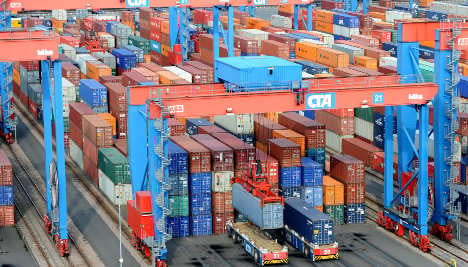Europe’s biggest economy exported €91.9 billion ($119.6 billion) worth of goods in calendar and seasonally-adjusted terms in January, an increase of 1.4 percent from December, the national statistics office Destatis said.
That was much better than the 0.5 percent increase that analysts had been expecting. Imports rose even faster, adding 3.3 percent to €76.2 billion.
That meant the seasonally-adjusted trade surplus declined to €15.7 billion in January from €16.9 billion in December, statisticians calculated.
On a 12-month basis, the unadjusted trade surplus expanded slightly to €13.7 billion in January compared with €13.2 billion a year previously, as exports grew by 3.1 percent year-on-year while imports advanced by 2.9 percent, Destatis said.
While exports to eurozone countries edged up only 0.4 percent, imports from Germany’s eurozone partners rose by 2.8 percent.
And that, for Berenberg Bank economist Christian Schulz, suggested that a healthy rebalancing of trade within the single currency area was underway, with Germany now halving its trade surplus with its eurozone partners since 2008.
“Germany is helping its friends,” Schulz said.
“German domestic demand is one of the stabilising forces in the eurozone’s adjustment crisis. Stronger German demand allows the eurozone crisis economies to export more to Germany,” Schulz argued.
Natixis economist Johannes Gareis also welcomed the better-than-expected trade data.
“In seasonally adjusted terms, German exports surprised to the upside and German imports surprised even more,” he said.
“All in all, January’s slight increase in exports is good news for German growth in the first quarter in 2013. The rise in imports should be interpreted as a good sign, too, as it indicates that German domestic demand is quite robust amid the euro zone crisis,” the expert said.
AFP/hc



 Please whitelist us to continue reading.
Please whitelist us to continue reading.
Member comments